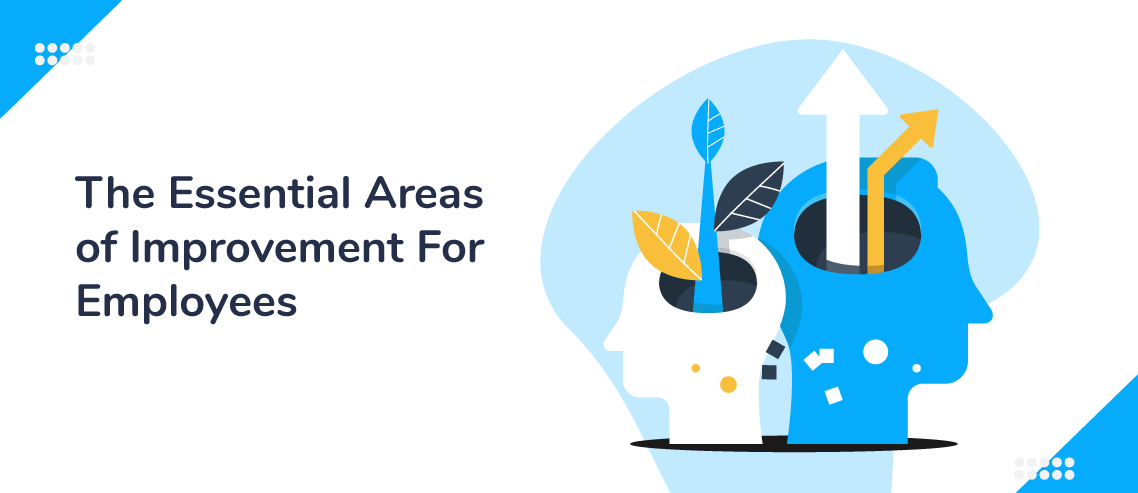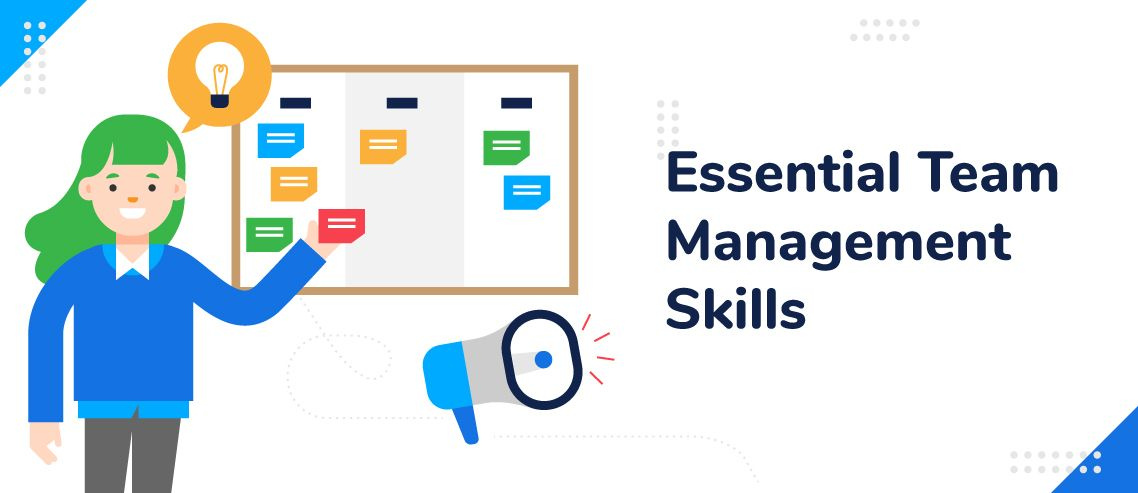22 Essential Areas Of Improvement For Employees In 2024

As William S. Burroughs said, “When you stop growing you start dying.” And although he wasn’t specifically talking about employees and their growth in the workplace, he may as well have been. Indeed, continued growth is important for workers across the board in all industries and positions.
But self-improvement is a broad topic, and it can be hard to figure out where improvement is most needed. Here, we’ll give you 10 essential areas of improvement examples that you and your employees can implement to get in tip-top shape.
22 Opportunities for Areas of Improvement in the Workplace
1. Communication
Everyone knows that communication is vital for personal relationships, but people often overlook how important it is for working relationships as well. Although the areas of disagreement will be different, communication is important for resolving disputes and making sure that all team members are on the same page.
Luckily, communication comes with practice, and it’s possible to invest in training programs to help your employees communicate better amongst each other — and of course, with their managers as well.
It can also be worthwhile to look into investing in better workplace communication tools, like ZoomShift. Along with helping organizations streamline their employee scheduling and time tracking, ZoomShift helps managers and employees have seamless communication. You can have 1:1 chat with an individual, group chat, or organization-wide announcements, all from a single app.
Get started for free with ZoomShift to manage your employee scheduling and communication with a single app.
2. Conflict Resolution
As unpleasant as they are, conflicts are bound to pop up at some point. And when they do, they can take a significant amount of time away from work, setting your business behind schedule. Plus, if the conflict is particularly heated, it can cause the involved employees to work together with less harmoniously and efficiently even after the conflict is resolved.
Like communication skills, conflict resolution skills can be taught and practiced, so make sure you discuss strategies with your employees to get the right habits instilled in them before a conflict arises.
3. Time Management
Employees often have many tasks to juggle, and it can be difficult for them to figure out how to fit all of them into their busy work schedules. This can often lead to a feeling of overwhelm, which lowers morale and can induce a sense of inertia.
The solution is to teach your employees time management skills. There are lots of different strategies out there and many digital tools that can help them get better, like time tracking apps, planners, timers, and more.
Employees can also use ZoomShit to track their time, which can help when trying to figure out exactly how much time is spent at work. Also as a manager, it would give you an overview of who is working when and for how long. This would help you create a shift wisely and reduce overtime in the organization.
4. Concentration
Concentration is the mental faculty that allows you to put your mind on a specific task or topic and keep it there for a sustained period of time. Needless to say, concentration is a vital skill in any field of work as it helps employees continue their work without giving in to distractions that could reduce their productivity.
Concentration is a very hard skill to teach because it is very ephemeral, but you can start by introducing some mindfulness training as a legitimate area of improvement at work.
5. Leadership
Some people may be natural leaders, but that doesn’t mean that those who aren’t are just dead in the water. Leadership, like any other skill, can be practiced and improved upon by anyone who is willing to make the effort.
Of course, not all employees will have leadership roles, but implementing some leadership training for your employees can be immensely helpful, even for those who don’t need to lead on a regular basis.
One easy way to start developing leadership skills in your employees is to have one of your managers mentor them so that they can learn the tricks of the trade.
6. Taking Feedback
No matter who you are, getting negative feedback is almost invariably difficult. No one likes to hear bad things about themselves and will go to lengths to defend themselves. Still, everyone has their flaws, and employees need to hear about their mistakes and missteps so that they can start to improve.
Ideally, you want your employees to stay calm and attentive when receiving feedback so that they can take it more to heart. You don’t want them getting defensive or lashing out at you.
Luckily, better feedback-taking skills can be achieved with coaching and other educational programs.
7. Problem Solving
As much as we may try, it’s completely impossible to plan for every possible situation that may come up. But that doesn’t mean you won’t have to deal with some pretty big problems along the way just because you can’t plan for them.
Unfortunately, problems are bound to happen, so employees need to develop strong problem-solving skills if they want to succeed in the workplace.
Investing in a training program is a great area of improvement example for your employees that can be very helpful when it comes to this.
8. Honesty
Everyone knows that honesty is a virtue, but many people and businesses don’t realize just how important it is in the workplace. Overall, being honest helps to foster a more trusting and comfortable work environment.
To improve honesty in your workplace, instruct your employees to always tell the truth. However, you’ll also need to make sure that your employees feel safe when owning up to mistakes they’ve made, so try to reduce discipline and focus on mentoring instead.
9. Self-Advocacy
Employees often feel like a cog in the wheel when it comes to businesses. They often figure that the business they’re working at doesn’t have their best interest in mind and will do their best to exploit their employees given the chance.
Whether this is true or not, employees need to learn how to advocate for themselves to make sure they’re getting what they need out of the workplace. Not only will this help them take a more active role in the workplace, but it can also help foster deeper respect among other employees and managers.
10. Listening
Alongside communication, listening is an absolutely essential skill. Listening serves many purposes, from connecting with your coworkers to understanding what the directions for an assignment are.
Listening also goes hand in hand with concentration. Typically, once an employee improves their concentration, they’ll become a better listener as they have less trouble staying focused on one topic for a long period of time.
11. Adaptability
Adaptability is about being open to change and willing to modify plans and strategies as the situation evolves. It also involves being able to pivot when faced with unexpected challenges or setbacks.
An employee who is adaptable and flexible would be able to cope with sudden shifts in projects, deadlines, or company directions without losing productivity.
To cultivate this quality, you can offer training that focuses on developing a flexible mindset and encouraging cross-functional skill development.
It’s also a good idea to create a supportive environment where change is viewed as an opportunity rather than a threat.
12. Collaboration
Collaboration is a skill that allows people from different backgrounds to work together and generate value that a non-collaborative business environment could never match. Collaborative teams are more likely to come up with innovative ideas, solve problems efficiently, and stay productive in the face of challenges.
Promoting collaboration is easy. You can begin by organizing team-building activities and assigning collaborative projects. Additionally, equip your team with resources such as project management tools or online platforms for virtual collaboration (such as Asana, Trello, and ClickUp).
13. Prioritization
With never-ending tasks and limited time, employees need to prioritize their tasks based on urgency and importance. This will not only increase productivity but also reduce stress and anxiety levels as they are better able to focus on the most critical tasks first.
You can help your employees better prioritize their tasks through the Eisenhower matrix, which involves sorting tasks into four categories:
- Do First (Urgent and Important): Tasks that need to be done immediately.
- Schedule (Important, but not Urgent): Tasks that are important but can be scheduled for later.
- Delegate (Urgent, but not Important): Tasks that are urgent but can be delegated to others.
- Don’t Do (Neither Urgent nor Important): Tasks that can be eliminated.
14. Emotional Intelligence
What would make an employee stand out from the rest? Their ability to recognize and manage their own emotions as well as the emotions of the people around them. This is exactly what emotional intelligence in the workplace refers to.
Employees with high emotional intelligence are self-aware, empathetic, and have excellent communication skills. They can handle conflicts effectively, build strong relationships with colleagues and clients, and maintain a positive work environment even in challenging situations.
Improving emotional intelligence within your team can be achieved in a few ways. You can offer opportunities for self-reflection and feedback, promote open communication while actively listening to employee concerns, or conduct empathy training sessions.
15. Resilience
Business is a rollercoaster ride. It has its ups and downs, but what matters is how your employees handle the challenges and setbacks that come their way. If they are not resilient, they will crumble under pressure and fail to bounce back from failures.
As a leader, your role is to instill two key resilience concepts in your employees. Firstly, it’s crucial to treat both successes and failures the same way. Celebrate the highs, but don’t regard them as any more significant than the lows.
Secondly, it’s essential to have self-compassion in the face of setbacks. Don’t kick yourself when you’re down. Instead, be on your side and be your number-one cheerleader.
16. Goal Setting
Achieving targets can seem impossible if you don’t adopt a systematic and organized approach. This is where goal setting comes into play. This skill involves breaking down larger objectives into smaller, manageable tasks, tracking their progress, and adjusting the strategies to meet them as needed.
Encourage employees to set SMART goals — goals that are specific, measurable, achievable, relevant, and time-bound. This will ensure that their goals are clear and realistic, making it easier to track progress and make strategy adjustments.
By integrating performance objectives into these goals, employees can align their individual achievements with overall organizational success, fostering a more focused and results-oriented approach.
17. Customer Service
Customer satisfaction is what keeps a business thriving at the end of the day. Whether dealing with external clients or internal stakeholders, excellent customer service skills can significantly improve the reputation of your business.
What employees need to understand is that customer service is not just about handling complaints and inquiries, but also about going above and beyond to exceed customer expectations. This involves actively listening to customers, showing empathy, and creating a positive experience overall.
Role-playing customer scenarios and providing feedback can be an effective way to teach this skill. You should also convey real customer feedback to your employees so that they can make the necessary changes to improve their customer service.
18. Decision Making
Decision-making is a critical skill to have in the workplace. Employees should be able to analyze information, weigh options, and choose the most effective way forward.
To make sure your employees are confident and accurate in the decisions they make, give them training on critical thinking, data analysis, and risk assessment. Workshops or seminars that simulate real-life decision-making scenarios can also be beneficial.
19. Financial Literacy
Financial literacy is not just for the finance department. It is a crucial skill for all employees to have, particularly for those in management positions.
Knowing how to read financial reports, plan budgets, and make predictions is key to making good decisions that are in sync with the company’s objectives and fiscal well-being. It’s also helpful to understand basic money terms like return on investment, profit and loss, and cash flow.
What’s more, improving financial literacy can help employees make better financial decisions in their personal lives. They’ll know how to better manage their loans, save for retirement, and invest money wisely.
20. Cultural Competence
All modern businesses aim to achieve cultural diversity in their offices. Why? Because people from different backgrounds can bring different ideas and perspectives to the table, leading to innovation and growth.
However, to turn these unique ideas into success stories, your employees need to be culturally competent. This means they should not only understand and respect different cultures and their values but also actively seek out different perspectives and communicate effectively across these cultures.
To promote cultural competence in your workplace, encourage people to attend multicultural events. You can also organize workshops on sensitivity and inclusion training.
Remember, cultivating cultural competence does more than create a harmonious workplace. It also boosts your organization’s ability to succeed in the global market
21. Continuous Learning
We live in a time marked by rapid technological change and evolving consumer demands. For your business to stay competitive, your employees must be willing to learn new skills and adapt to changing circumstances continuously.
Take, for example, your marketing department. With the rise of social media and digital marketing, traditional marketing strategies have become obsolete.
One way to encourage continuous learning is by providing ongoing training opportunities or supporting employees’ attendance at conferences and workshops related to their field. Got data engineers in your team? Consider providing them access to DP-203 exam dumps online.
You can also consider implementing a mentorship program where experienced employees can share their knowledge and skills with younger or less experienced colleagues.
22. Accountability
Employees make mistakes and it’s okay. What’s not okay is when they fail to take responsibility for their actions. Lack of accountability can lead to a toxic work culture where people are quick to point fingers and avoid taking ownership of their mistakes.
To make sure this doesn’t happen in your workplace, encourage employees to take ownership of their work and mistakes. Let them know that it’s okay to make mistakes as long as they learn from them and take responsibility for fixing them.
This will not only promote a more positive work environment but also improve employee performance and growth.
Bonus Tip: Areas of Improvement for Managers Examples
If you want to take your workplace to the next level, consider investing in ZoomShift. ZoomShift makes it easy to make schedules using its drag-and-drop schedule builder — and just as easy to notify your employees of the schedules via push notification, text, or email. ZoomShift can also be used to track time to help ensure that you’re staying efficient. Plus, ZoomShift allows employees to swap shifts amongst themselves.
Ultimately, ZoomShift the employee schedule maker can help you expedite and automate scheduling and save managers time.
How ZoomShift helps you with employee scheduling and time tracking
Key Takeaways
Developing as an employee is a long-term project, but it’s worth it in the end. Whether you’re an employer or manager, there are always ample opportunities to implement areas of improvement at work. Try your best to stay aware of your blindspots, fix them, and all will be golden.
JD enjoys teaching people how to use ZoomShift to save time spent on scheduling. He’s curious, likes learning new things everyday and playing the guitar (although it’s a work in progress).



